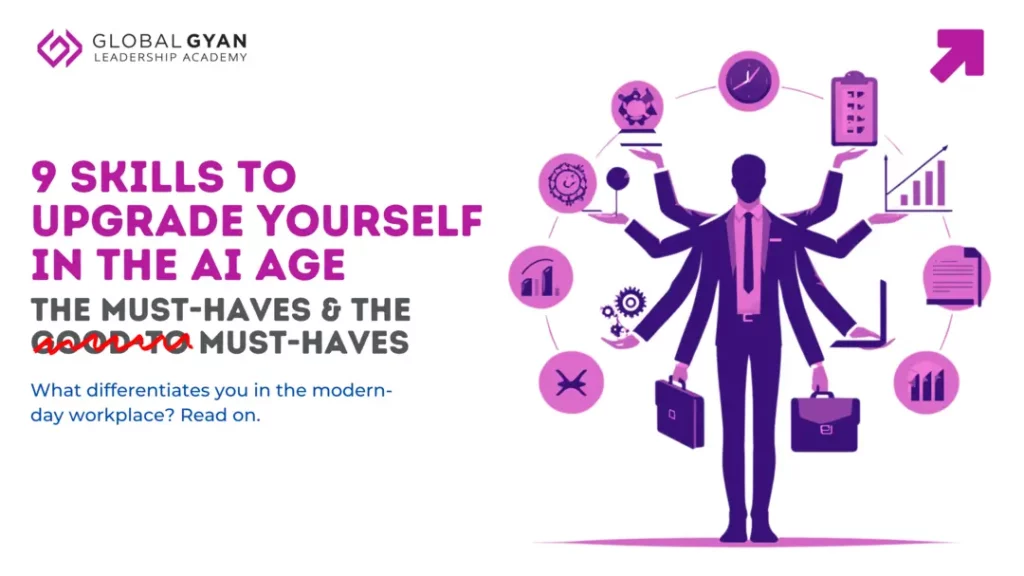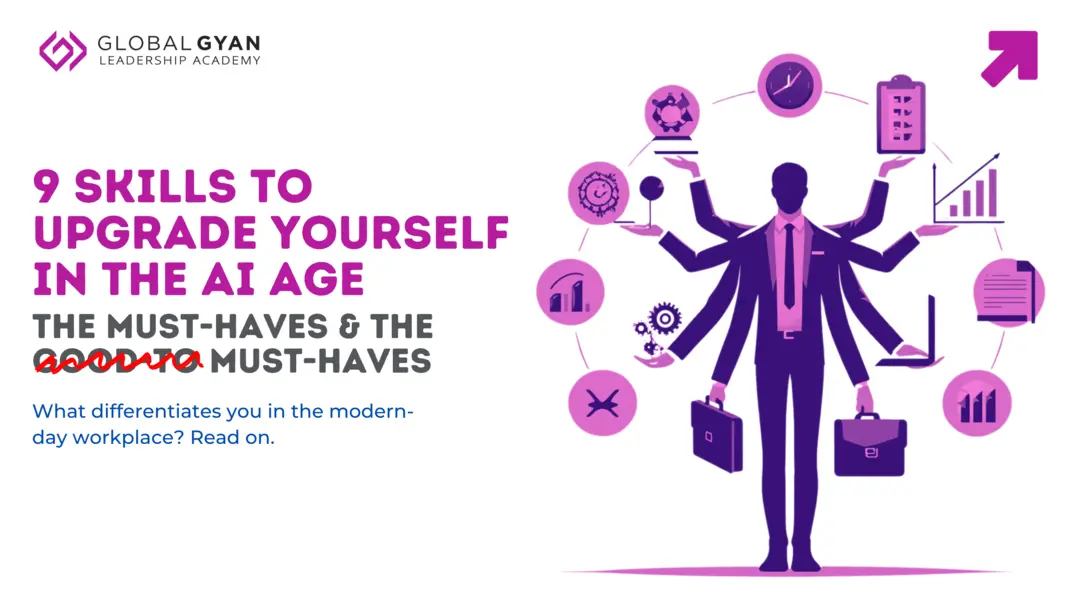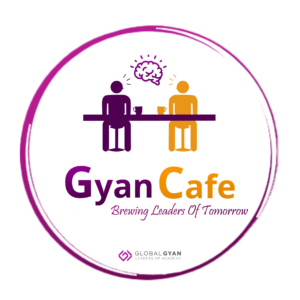9 Skills Every Employee Should Learn in 2025 (To Stay Ahead)

Updated on: January 2026

The workplace is changing faster than ever. New tools, AI, hybrid work, shifting business models—everything is evolving, and so must we. In this environment, the skills every employee should learn in 2025 are no longer “good to have”; they’re essential for staying relevant, competitive, and future-ready.
Whether you’re just starting out or looking to grow your career, the most in-demand skills for employees today go beyond technical knowledge. You now need digital fluency, strategic thinking, and strong human skills to thrive in the modern workplace.
About This Guide:
This article is developed by GlobalGyan Leadership Academy, a leading provider of corporate training and experiential learning for India’s top organisations. Our faculty have coached 50,000+ professionals across industries in future-ready workplace skills.
Below, we break down the 9 future-ready skills every professional should start building today to stay ahead in the next decade.
The Most In-Demand Skills for Employees in 2025
What You Will Learn From This Guide
This guide breaks down the 9 most essential workplace skills employees should learn in 2025. You’ll understand:
- what each skill means,
- why it matters in today’s workplace,
- how it impacts your career growth, and
- simple ways to start developing the skill immediately.
Whether you’re starting out or aiming for career advancement, these skills will help you stay relevant in the future of work.
#Skill 1. Digital Literacy: The New Workplace Survival Skill
The modern-day workplace runs on digital tools, and achieving proficiency in them is as essential as breathing air! From emails to project management software, being comfortable with digital tools has become as crucial as knowing how to operate a computer was 20 years ago. Digital literacy encompasses a broad spectrum ranging from basic tasks like file sharing and calendar management, to more complex activities like using cloud platforms (Google Workspace, Microsoft 365), handling collaborative tools (Slack, Trello), and leveraging video conferencing software (Zoom, Teams).
With more companies adopting the hybrid/fully remote work models, digital literacy has become a key differentiator for employees. Organisations now expect employees to be comfortable with and communicate effectively using various digital channels. Cybersecurity is also a growing concern. Thus, understanding how to safeguard data, avoiding phishing scams and maintaining privacy has become a non-negotiable in this digital-first world. For instance, cloud storage services like Dropbox and Google Drive require familiarity with secure file-sharing practices, an essential part of today’s digital transformation.
How to build it: explore 1–2 new tools a month (like Notion, Asana, or Drive), complete basic tutorials, and practise them in daily work.
#Skill 2. Data Literacy: Making Sense of the Numbers
Data literacy entails reading, analysing and interpreting data to make informed decisions. With businesses relying more and more on data-driven strategies, understanding how to use tools like Excel, Google Sheets, or advanced platforms like Tableau and Power BI can make you stand out in the crowd! With businesses relying heavily on data-driven decisions, future skills for professionals now include the ability to analyse, interpret and present data effectively. Once you learn how to interpret data, it’s easy to then create compelling narratives, render them in a visual manner (in the form of graphs & charts which can be added to presentations) and procure buy-ins for strategic decisions.
Given the breakneck pace at which technology is advancing, data is the lifeblood of organisations and the ability to translate numbers into actionable insights is invaluable. Even roles that traditionally didn’t require data literacy—like HR or customer service—are now embracing data to improve efficiency, track performance and personalise customer interactions. Marketing professionals, for instance, analyse data from Google Analytics to optimise campaigns, while product managers study customer data to refine their offerings.
Resource Corner: Start your data literacy journey with our Collecting, Analysing & Presenting Data course today!
#Skill 3. Leadership Skills: Lead with Confidence
You don’t need to have “manager” in your title to lead. Leadership is about taking initiative, guiding teams, and inspiring confidence in others. Even junior employees can exhibit leadership by taking ownership of their work, mentoring peers and influencing positive change. True leadership is about guiding others toward a common goal whilst cultivating an environment of trust and collaboration. And we’re certain of one thing: leadership skills will set you apart in 2025.
To build leadership skills, consider reading leadership books, attending leadership workshops or finding a mentor. Leadership courses and real-world practice will help you develop the confidence and skills to lead effectively. Whether you aim to be a team lead or a department head, leadership skills are essential for career growth. Leadership also ranks among the top career development skills employers value in 2025. Leadership has become a core requirement in modern workplace expectations, especially for employees seeking career advancement.
Resource Corner: Want to lead like a pro? Enrol in our diverse leadership courses today!
#Skill 4. Communication Skills: The Bridge to Success
In any job, communication is key. Whether you’re speaking with a colleague, presenting to a client, or sending an email, how you convey your message matters. Good communication isn’t just about speaking clearly—it’s about ascertaining your message is understood and received in the way you intended.
Today, communication has expanded to include virtual platforms. Emails, video calls and instant messaging are all part of daily communication, which each requires a different approach. Writing clear and concise emails is an art, while presenting on Zoom involves engaging visuals and a strong narrative. Tools like Grammarly can refine your written communication, ensuring it’s both professional and engaging.
Communication skills are also essential for effective collaboration. Teams that communicate well can solve problems faster, innovate better and maintain a positive work environment. Active listening, non-verbal communication and empathy also play a part in forging strong interpersonal connections at work.
Resource Corner: Explore our communication courses designed just for you!
#Skill 5. Emotional Intelligence (EQ): Drive Results with The Human Touch
Emotional Intelligence (EQ) is the ability to understand and manage your emotions while also being aware of others’ emotions. In 2025, as remote work and digital communication become more prevalent, EQ is one of the most in demand skill today! It helps employees traverse interpersonal relationships, resolve conflicts and lead with empathy. In fact, cultivating a high-level of EQ might just be the thing that gets you promoted.
EQ involves four key components: self-awareness, self-management, social awareness and relationship management. Employees with high EQ can recognise when they’re stressed and take steps to manage it in order to prevent burnout. They also understand how their emotions affect their interactions with others, making them better team players and leaders. Get started with your EQ journey today! EQ is increasingly recognised as one of the most important soft skills in the modern workplace.
How to build it: start by tracking emotional triggers, asking for feedback, and practising active listening in meetings.
#Skill 6. Problem-Solving Skills: Be the Office Sherlock
Problem-solving is a universal skill that transcends industries and roles. You can be sure that this is a high demand skill for the next decade, as it was in the previous many decades. With the complexity of workplace challenges increasing, employees who can think critically and come up with creative solutions will stand out in the crowd. Whether it’s resolving a technical glitch, handling a customer complaint, or streamlining a business process, problem-solving skills are essential.
Critical thinking is at the heart of problem-solving. It involves analysing situations from different perspectives, identifying the root cause and developing logical, efficient solutions. Tools like mind maps and flowcharts can help break down complex problems into manageable steps, allowing you to see the bigger picture and craft innovative solutions.
By honing your critical thinking and problem solving skills, you become the “go-to” person in your organisation for all things challenges, be it operational, technical, or interpersonal in nature. Investing in problem-solving skills will ensure that no challenge is too big to handle in 2025, especially for professionals committed to employee upskilling.
#Skill 7. AI and Automation: Work Smarter, Not Harder
Artificial intelligence (AI) and automation aren’t just buzzwords anymore; they are transforming how we work. An in-demand skill in 2025, understanding how to use AI-powered tools can help you streamline processes and boost productivity. AI is no longer the future—it’s the present. From automating routine tasks to providing customer service via chatbots, AI is all about efficiency.
For example, platforms like Zapier help automate repetitive tasks such as data entry, freeing up time for more strategic work. Tools like Grammarly use AI to refine your writing, and voice assistants like Alexa and Siri can schedule meetings and set reminders. Learning how to integrate AI tools into your daily routine can give you a major edge in productivity.
Additionally, AI is transforming industries. In finance, AI-driven algorithms handle stock trading, while in healthcare, AI assists doctors in diagnosing diseases faster and more accurately. AI is also predominantly used in content creation and automating writing tasks like report generation, etc. In short, understanding the basics of AI and how automation works in your industry can help you leverage technology effectively, reduce errors and stay ahead of the competition.
Think of AI as your silent partner, working in the background to make your professional life easier.
#Skill 8. Adaptability: The Power of Flexibility
During the COVID-19 pandemic, adaptability became a survival skill, as businesses shifted to remote work almost overnight. Those who adapted quickly to digital tools and virtual collaboration remained productive, while others struggled. And this trend has continued on. With new technologies, market demands and business models emerging at lightning speed, adaptability, or the ability to quickly learn new skills and adjust to changes, is a crucial skill in 2025. In a fast-changing workplace, adaptability is one of the essential workplace skills for 2025, helping employees stay relevant even as industries evolve. Employees who can embrace change rather than resist it are better equipped to take on challenges in a dynamic environment.
Adaptability often goes hand-in-hand with a growth mindset—the belief that you can develop new abilities through dedication and hard work. This mindset promotes a proactive approach to learning and growth, making it easier to adapt to new roles, industries, or technological advances. This flexibility helps build career-ready skills that remain valuable across industries.
To become more adaptable, focus on continuous learning. Take on new challenges, seek feedback, and stay updated on industry trends. Adaptable employees are often the first to embrace new technologies or processes, positioning themselves as leaders in change management.
Resource Corner: Join our continuous learning platform & never miss another leadership insight. Subscribe to Gyan Cafe today!
#Skill 9. Time Management: The Key to a Balanced Work-Life
Time management is one of the most practical and sought-after skills in 2025. As hybrid and remote work models are growing in popularity, managing your time efficiently can help increase productivity and reduce stress. Good time management involves prioritising tasks, setting clear goals and avoiding distractions.
One of the most effective time management techniques is the Eisenhower Matrix, which categorises tasks based on urgency and importance, helping you focus on what truly matters. Time-blocking, where you allocate specific hours to specific tasks, can also help streamline your day. Alternatively, apps like Todoist, Asana and Time Doctor offer great tools to track tasks and deadlines. These tools help you stay organised during hectic work phases, prioritise your responsibilities and avoid multitasking, which often leads to burnout.
How to build it: start with 30-minute time-blocking, use a daily to-do list, and reduce context-switching by batching similar tasks.
Why These Are the Skills Every Employee Should Learn in 2025
The year 2025 is all about staying sharp, both digitally and emotionally. All the skills we’ve listed above are in high demand now, and will be in high demand for the foreseeable future and we’ve got you covered in all these areas. These professional skills to grow your career are not optional anymore they are the foundation for long-term success, These workplace skills also play a vital role in supporting ongoing professional growth, no matter what career stage you’re at. So, what are you waiting for? Get in touch with our representative Kajal Motwani (kajal@globalgyan.in) to start designing your personal learning journey today!
Frequently Asked Questions (FAQs)
1. What are the most important skills employees need in 2025?
The most important skills for 2025 include digital literacy, data literacy, leadership, communication, problem-solving, emotional intelligence, AI awareness, adaptability, and time management.
2. Why are digital and data skills so important today?
Because almost every role now uses digital tools and data-driven decision making. These skills help employees work faster, collaborate better, and make informed choices.
3. How can I quickly improve my workplace skills?
Start with short online courses, practise new tools weekly, ask for feedback, and take on small stretch assignments to build confidence and capability.
4. Which skills increase employability the fastest?
Digital literacy, communication, AI awareness, leadership qualities, and strong problem-solving capabilities are among the top skills employers look for today.
5. What soft skills should employees focus on in 2025?
Emotional intelligence, adaptability, collaboration, active listening, and conflict resolution are essential soft skills for a modern workplace.
6. How can employees develop emotional intelligence at work?
Reflect on your reactions, practise active listening, seek feedback, and observe how emotions influence decisions and communication.
7. Do employees really need AI skills?
Yes, AI isn’t about coding. It’s about using AI tools for automation, content generation, decision support, and boosting productivity in day-to-day work.






Responses